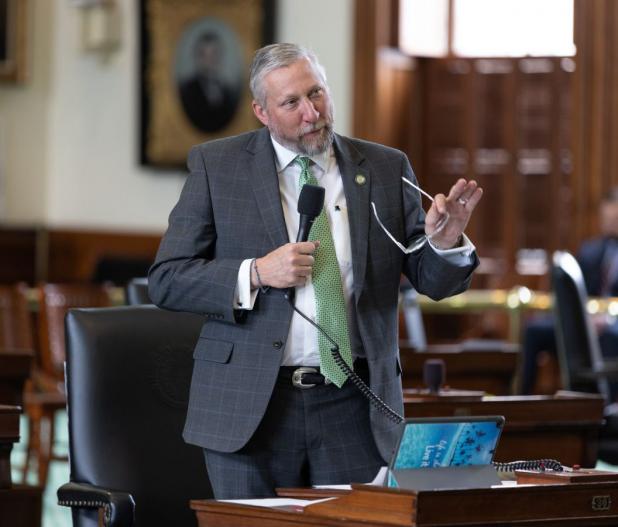
Springer bill could mean raises for County law enforcement
A bill authored by state Sen. Drew Springer (R-Muenster) and signed into law on June 6 could boost salaries for the county law enforcement offices starting next year but could make it difficult for rural county police departments to remain fully staffed.
Senate Bill 22 establishes a grant program to provide financial assistance to raise pay rates for sheriff ’s offices, prosecutor’s offices, and constable’s offices in counties with a population of 300,000 or less, Mr. Springer said in a press release.
Young County Sheriff Travis Babcock said the program is positive for Young County.
Sheriff Babcock earns $63,505 in total compensation from the County, according to the Fiscal Year 2023 budget. The two County Constables earn $27,475 Olney Police Chief Dan Birbeck noted that salaries for OPD officers were already competitive with the salaries proposed under SB22 but smaller municipalities could have trouble competing with the higher salaries and could lose officers. Olney police officer salaries start at $44,772 or $20.50 per hour and officers work an 84hour, two-week schedule.
Chief Birbeck said he “always (supports) paying officers more, but small police agencies and sheriff ’s offices work closely with each other, and officers regularly move from one to the other.”
“Smaller agencies are going to hurt and they are going to have trouble recruiting,” he said. “It doesn’t impact us as far as recruitment goes.”
Under the program, Young County Commissioners would submit an application each fiscal year to receive grants for the three offices. Counties that participate in the program are required to use the funds – between $250,000 and $500,000, depending on county population – to provide a minimum annual salary of $75,000 for the sheriff, $45,000 for each sheriff ’s deputy who makes motor vehicle stops, and $40,000 for each jailer working with prisoners or jail security. Additional funds must be used to purchase equipment.
The program requires prosecutors’ offices to use the grant funds to increase the salaries of an already-employed assistant attorney, investigator, or victim assistance coordinator or to hire additional staff. Prosecutors’ offices can receive between $100,000 to $275,000 in grant funds, depending on the county’s population.
Young and Stephens Counties split the cost of the 90th Judicial District prosecutor’s office run by District Attorney Dee Peavy. Mrs. Peavy said she would coordinate with the Commissioners and look into the grant process “to take advantage of this opportunity.”
“I am pleased to see that our legislators and Governor Abbott recognize that our law enforcement agencies, especially rural agencies, struggle to maintain their workforce and often lack the resources that they need to perform the essential services that they provide for all of us,” Mrs. Peavy said. “It is a step in the right direction.”
Young County may also apply for a grant to raise constable salaries but must provide at least 75 percent of the minimum constable salary of $45,000.
“In rural Texas, our law enforcement and prosecutor offices struggle to recruit and retain staff simply because rural counties don’t have the tax base to hire and offer competitive wages,” Sen. Springer said in a statement. “In fact, we have counties in Texas where a Sheriff and only a few deputies, if any, cover thousands of square miles, which heavily impacts response time during emergencies and creates a public safety threat.”
